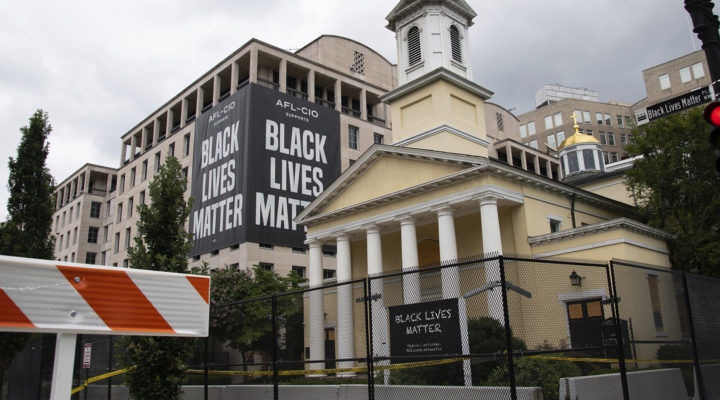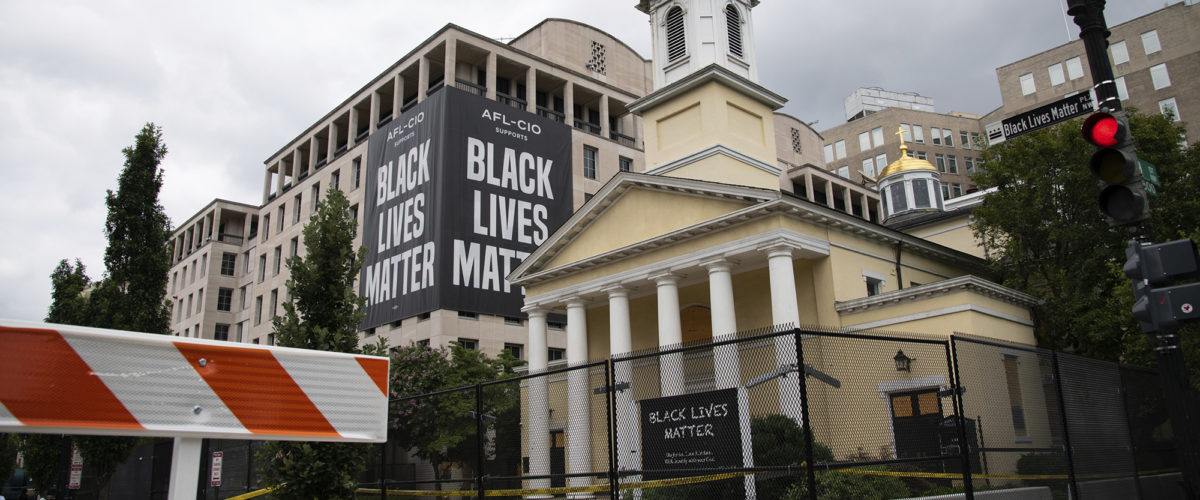Inauguration Januarys typically raise the stress levels of clergy serving churches in Washington, D.C., local ministers say. But the addition of a pandemic, a brutal election cycle and the Jan. 6 storming of Capitol Hill by Donald Trump supporters sent tensions through the roof for area pastors and their communities ahead of Joe Biden’s scheduled inauguration today.
“People are numb, they are angry, they are hurt, and they are dismayed,” said Dana Colley Corsello, canon vicar of the Washington National Cathedral. Online grieving and venting sessions since Jan. 6 have been “a kind of virtual handholding. Hundreds of people have been saying they were so scared and frightened.”
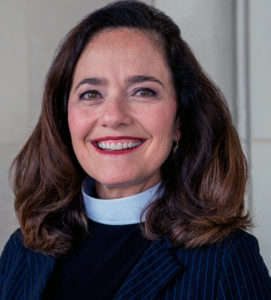
Dana Colley Corsello
Corsello and other clergy in the area describe faith communities that already were tense after four years of constant conflict during the Trump presidency and his false post-election claims of a conspiracy that cheated him of a second term and handed the White House to Biden.
D.C.-area churches have responded with a variety of approaches, including virtual gatherings and in-person service activities to provide comfort and guidance through what has turned out to be a very difficult January 2021.
History and service at New Bethel
It helps to apply some historical perspective and old-fashioned ministry, said Dexter Nutall, pastor of New Bethel Baptist Church in Washington, D.C.
Nutall grew up in the congregation, which was on the front lines of the Civil Rights Movement. “This church, which is 119 years old, is located in an area of D.C. called Shaw, which was ravaged in ’68 when (Martin Luther) King was assassinated,” he explained.
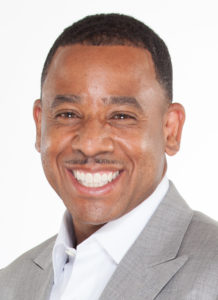
Dexter Nutall
The congregation’s pastor at the time, Walter Fauntroy, was a colleague of King’s and served as the District of Columbia’s delegate to the U.S. House of Representatives, Nutall said. “Public policy and politics have been a component of my faith awareness and practice all my life.”
Those and other historical facts provide much-needed perspective to the events of early 2021, he added. “Elections and inaugurations have always been part of the conversation, including this situation we have now.”
One need go back only four years for even more perspective, Nutall said. “This is no surprise to me, where we are right now. Donald Trump has been who Donald Trump is. The concerns that we had, and that I had, are becoming reality. It may all be shocking, but it’s no surprise. We saw it before in Charlottesville.”
Then as now, Nutall said he preached about justice and the importance of keeping current events, even when dire, from overshadowing faith in Christ. “I am grateful that we find ourselves in a time of prayer and fasting as a church because I think there is a responsibility that each of us has to others.”
“I am grateful that we find ourselves in a time of prayer and fasting as a church because I think there is a responsibility that each of us has to others.”
So it was that on Saturday, Jan. 9, members of New Bethel distributed groceries to those in need in a nearby residential development. In addition to helping others, this project also served as a form of pastoral ministry for those involved, he said.
“I don’t want to minimize what happened on Jan. 6, certainly, but I don’t want to suggest it’s so big that it’s beyond the pale of what we normally do in terms of ministry.”
Pastoral care at First Baptist
Clergy also have been pressed to bring a prophetic witness in response to the mob assault on Capitol Hill, said Julie Pennington-Russell, senior pastor of First Baptist Church of the City of Washington, D.C.
Not that it’s anything new for District-area churches, she noted. “For the last four years there has been a need for a fair amount of prophetic witness — speaking truth to power.”
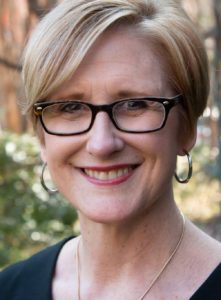
Julie Pennington-Russell
But seeing Confederate flags and nooses carried through the halls of Congress by Trump’s rioters only increased that need, Pennington-Russell said. “I think we all know what would have happened if it had been Black Lives Matter flags instead of Confederate flags. The response would have been very different.”
In times like these, pastors must be equally attuned to the pastoral needs of their communities, she added. “We have to balance the need to speak truth to power with appropriate outrage and what it means to love our neighbors and to love people who make your blood boil. We need to guide people through how that looks and how to embody that within our own families.”
Pennington-Russell said she can identify with that pain, which is made worse by the proximity of the events. “There is a deep, intrinsic trauma when it happens right here in your backyard. Something about that is horrifying, and especially when it’s in the nation’s capital.”
First Baptist hosted Zoom meetings on and after Jan. 6 for participants to voice those feelings. “We’ve talked about what it is to be the church in a time and place like this and a lot of people expressed rage and feelings of hatred,” she said. “This is that pastoral piece. We let people know there is extra prayer support and the presence of pastor if they need that.”
Helping families cope at Vienna Baptist
An added pressure for pastors is negotiating the variety of ways individuals in their communities are processing the stress of political and social upheaval.
“The parents of young children in my church are struggling to help their kids process the scary images on television and find the words to explain the hatred on display,” said Austin Almaguer, lead pastor of Vienna Baptist Church in Vienna, Va., a suburb of Washington, D.C.
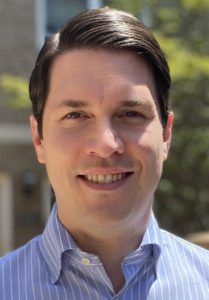
Austin Almaguer
“My older adults are frustrated that this moment became inevitable after four years without any accountability for the president or his allies. White supremacists have made Washington, D.C., a target for their terrorism, and that creates a fearful and anxious climate for everyone.”
Almaguer said a curfew imposed after the Capitol assault contributed to widespread fear as people worried about the whereabouts and safety of loved ones. “This is compounded by the grief people already were carrying around after not being able to be with loved ones on Christmas and the loneliness felt by people who have been physical distancing for nine months.”
Faithful ministry in this setting includes providing pastoral presence and prophetic preaching, he said. “People need to know that they are not alone — that as a community we will navigate the collective fear, grief and anger together. They are also desperate for preaching and teaching that clearly articulates how denouncing white supremacy and being anti-racist are necessary expressions of faithful discipleship to Jesus.”
Almaguer added that it’s equally important that he take care of his own emotional and mental health. That’s led him to lean into several approaches to self-care.
“I’ve spent more time in centering prayer and meditation the past week as a way of calming my spirit. I am grateful for active group texts and phone calls with clergy colleagues and close friends who have created safe spaces to share honest fears and frustrations. They’ve also helped me to laugh, which at times feels like a needed act of defiance to the hatred and violence.”
Pastoral load already heavy from COVID
Navigating virtual environments also can contribute to pastoral stress in this moment, said Corsello.
The Cathedral congregation already was worshiping and fellowshipping fully online due to the pandemic. Since the coronavirus outbreak, a wider virtual community has developed, including many who live overseas. Everyone, it seemed, needed comforting on and after Jan. 6, she said.
“We want to be responsive, pastorally, but it’s been hard.”
“The pastoral load since COVID has been enormous, and multiply that by several times because we have this national international congregation that was reacting to this event. We want to be responsive, pastorally, but it’s been hard.”
But the gathering continues, Corsello said. “We are in shock and in pain, but we think the best thing to do is gather, hold each other tight and stay in community. This is a safe place for people to come to really let their feelings and anxieties and hurts be known.”

